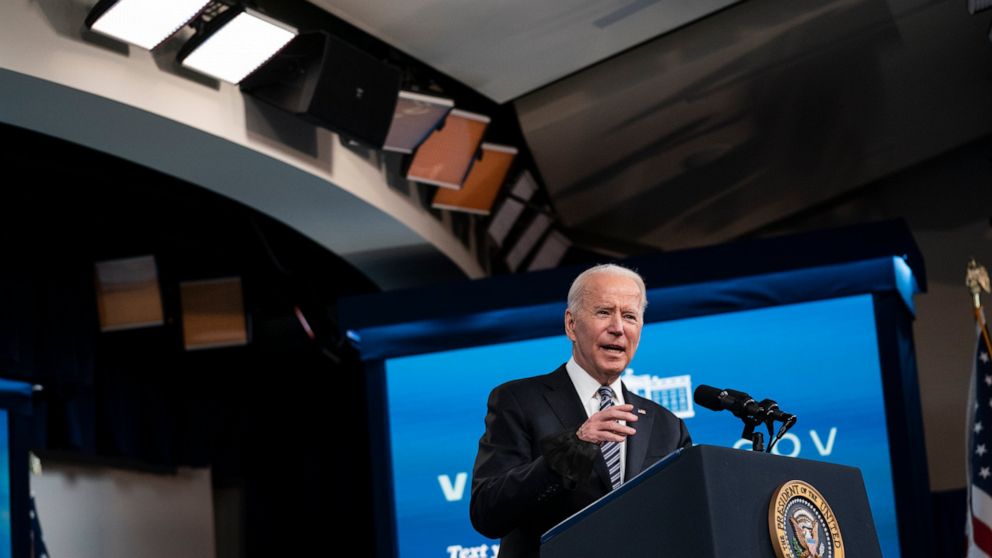Biden warns against gas price gouging after cyberattack
President Joe Biden has warned gasoline stations not to engage in price gouging as motorists wait for fuel to start flowing reliably through the Colonial Pipeline
President Joe Biden warned gasoline stations not to engage in any price gouging as motorists wait for fuel to start flowing reliably through the Colonial Pipeline, which reopened on Wednesday after falling victim to a cyberattack.
“Do not, I repeat, do not try to take advantage of consumers during this time,” Biden said Thursday in remarks at the White House. “Nobody should be using this situation for financial gain. That’s what the hackers are trying to do. That’s what they’re about, not us. That’s not who we are.”
The pipeline shutdown was a major concern for a young presidency that has also had to deal with a pandemic, a recession, an influx of unaccompanied children at the southern border, a troop withdrawal from Afghanistan and high-stakes showdowns globally that carry the specter of war. Administration officials understood the political and economic risks of rising gas prices and lines of autos snaking around service stations—all of which could imperil Biden’s agenda and Democrats’ control of Congress.
The president said he expects the pipeline to resume normal operations by next week and stressed the importance of improving the durability of U.S. infrastructure as part of his $2.3 trillion jobs plan. Biden said the government would take action to stop future cyberattacks, though he declined to comment on whether Colonial had paid a ransom.
“We do not believe the Russian government was involved in this attack, but we do have strong reason to believe that the criminals who did the attack, are living in Russia,” he said. “We’re also going to pursue a measure to disrupt their ability to operate. And our Justice Department has launched a new task force, dedicated to prosecuting ransomware hackers to the full extent of the law.”
The administration devoted the first half of the week to showcasing all the steps it was taking to get gas back to service stations in affected areas. It scrambled into action after ransom-seeking hackers on Friday shut down the pipeline, which delivers about 45% of the East Coast’s gas. The shutdown caused a supply crunch and spiking prices — all of which the administration was preparing to address. After the pipeline was reopened Wednesday, the president followed up with an executive order to improve cybersecurity.
The administration took a variety of steps to address the gasoline situation.
The Transportation Department was surveying how many vessels could carry fossil fuels to the Gulf of Mexico and Eastern Seaboard to provide gasoline. Waivers were issued to expand the hours that fuel can be transported by roadways. The Environmental Protection Agency issued waivers on gas blends and other regulations to ease any supply challenges.
The technology firm Gasbuddy.com found that 28% of stations were out of fuel in North Carolina. In Georgia, South Carolina and Virginia, more than 16% of stations were without gas.
The sudden supply crunch after Friday’s hack showed the challenges that can pop up for a White House that must constantly respond to world events. Republican lawmakers were quick to criticize the administration for previously canceling plans to construct the Keystone XL oil pipeline from Canada. Biden had canceled its permit over risks of spills and worries that climate change would worsen by burning the oil sands crude that would have flowed through the pipeline.
“The Colonial Pipeline crisis shows that we need more American energy to fuel our economy, not less,” House Republican leader Kevin McCarthy said Tuesday on Twitter, adding that Biden had “left our energy supply more vulnerable to attacks” by blocking the Keystone XL pipeline.
The cyberattack was but one of many challenges confronting the president.
Within just a few days, the Biden administration has also been dealt a disappointing monthly jobs report, a potentially worrisome increase in inflation and lethal violence in Israel. It is still trying to vaccinate the country against the coronavirus, send out hundreds of billions of dollars in economic aid and pass its own sweeping jobs and education agenda.
“You have to be prepared to juggle multiple challenges, multiple crises at one time, and that’s exactly what we’re doing at this moment,” White House press secretary Jen Psaki said Wednesday.
Higher energy prices often have political fallout, complicating reelection campaigns for incumbents outside oil-producing regions. The 1979 fuel shortage famously crushed Jimmy Carter’s presidential reelection efforts and helped usher in the Reagan era.
Research published last year by the World Bank looked at 207 elections across 50 democracies and found an oil price spike a year before the election “systematically lower the odds of incumbents being reelected.” The findings applied to both conservatives and liberals, showing a degree of pragmatism by voters.
The best way for Biden to respond was probably to show that he understands how rising gas prices can hurt family budgets and to move quickly to help fix the pipeline problem.
“It’s important for the president to show empathy and recognize the position that the average American is in vis-à-vis gas prices,” said Mark Jones, a political science professor at Rice University in Houston. “Gas prices are something that don’t affect the elite — and our politicians are all among the elite.”
![]()


